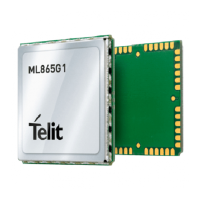ME310G1/ME910G1/ML865G1 AT Commands Reference Guide
80617ST10991A Rev.4 Page 374 of 545 2020-04-15
adjusting a time interval for series of UDP data packets
will be uploaded.
Time interval is not requested
Time interval in milliseconds
ip type for socket to open
<userIpType> parameter is only valid when <IPaddr> is domain name and dual stack
connection is open by #SGACT.
When <userIpType> is "no ip type chosen" ipv6 will be requested firstly. When ipv6 DNS
server does not support so ipv4 will be requested.
<closureType> parameter is valid for TCP connections only and has no effect (if used) for
UDP connections.
<lPort> parameter is valid for UDP connections only and has no effect (if used) for TCP
connections
If we set <connMode> to online mode connection and the command is successful we
enter in online data mode and we see the intermediate result code CONNECT. After the
CONNECT we can suspend the direct interface to the socket connection (N.B. the socket
stays open) using the escape sequence (+++): the module moves back to command
mode and we receive the final result code OK after the suspension.
After such a suspension, it is possible to resume it in every moment (unless the socket
inactivity timer timeouts, see #SCFG) by using the #SO command with the corresponding
<connId>.
If we set <connMode> to command mode connection and the command is successful, the
socket is opened, and we remain in command mode and we see the result code OK.
If there are input data arrived through a connected socket and not yet read because the
module entered command mode before reading them (after an escape sequence or after
#SD has been issued with <connMode> set to command mode connection), these data
are buffered and we receive the SRING URC (SRING presentation format depends on the
last #SCFGEXT setting); it is possible to read these data afterwards issuing #SRECV. Under
the same hypotheses it is possible to send data while in command mode issuing #SSEND.
<txTime> parameter is valid for UDP connections only and has no effect (if used) for TCP
connections. For slow servers it is recommended to adjust the time interval for uploading
series of data packets in order to do not lose data. The following data packet will be sent
after the previous data packet's time interval has been expired.

